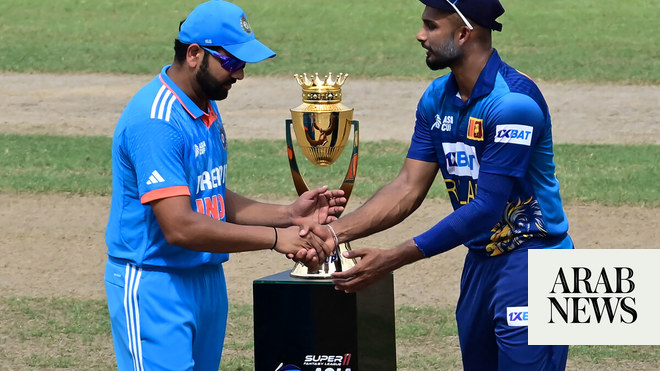
While tactics and strategy are vital ingredients for any skipper, so are leadership and a proper grasp of human relations
Sometimes a captain of a cricket team gets a decision wrong. It happened to Sri Lanka’s captain, Dasun Shanaka, in the Asia Cup Final last Sunday in Colombo. He won the toss and chose to bat under clear skies. Before play could start, rain arrived, causing a 40-minute delay.
For the latest updates, follow us on Twitter @ArabNewsSport
By the time the innings opened, overcast skies created a different set of conditions to those envisaged at the toss. In 15.2 overs, India’s bowlers demolished the Sri Lankan team, which could only total 50 runs. India then raced to victory in only 6.1 overs without loss.
Expectant home supporters were left surprised and disappointed at an embarrassing performance, which was Sri Lanka’s lowest total in a home match in the ODI format. This came after the delirious scenes that greeted Sri Lanka’s victory over Pakistan the previous Thursday, one which secured a place in Sunday’s final.
Inevitably, criticism has been levelled at Shanaka. In hindsight, he should have chosen to bowl. India’s captain said that he would have chosen to bat, had he won the toss.
Irrespective of the Shanaka’s decision, it is his ODI form that has drawn the most attention. After scoring a century against India in January 2023, his subsequent 17 innings have generated only 150 runs at an average of 9.4. This fell to 5 in the Asia Cup. During his pre-final press conference, he said that his captaincy was more important than his batting. He may have a point.
Since July 2021, he has led the team in 39 ODIs, achieving a 61percent-win ratio. As captain in 48 T20Is since October 2019, his win ratio is 49 percent. While these ratios are some way short of the highest ones achieved of 70-80 percent, there has been an improvement in Sri Lanka’s results under Shanaka’s leadership. This has stabilized Sri Lanka’s fragile relationships between board, players and political forces. It even embraced victory in the 2022 Asia Cup, played in T20I format.
Another captain under pressure prior to the 2023 ICC men’s ODI World Cup is Pakistan’s Babar Azam. His place in the team is assured, given that he is regularly ranked in the top-three batters across all formats. However, by all accounts, he struggled to keep his feelings in check after his team’s defeat by Sri Lanka last week.
The match went down to the final over, from which eight runs were required. The over was entrusted to a debutant bowler, in the team because of injuries to two regular quick bowlers. It seemed as if he might be the hero, narrowing the target to six from the final two deliveries and two from the final one, Sri Lanka having only one wicket to fall, a player having been injured during the match. Amid the drama, Sri Lanka’s striker squeezed out two runs to secure a place in the final.
In the post-match press conference, Azam was gracious, remarking that Sri Lanka played better cricket and that Pakistan was not “up to the mark with its bowling and fielding.” Later, rumors emerged that he was less than gracious in the dressing room, voicing disappointment with the performance of certain senior players, one of whom took objection. Another intervened to calm the situation down. Given that the result denied Pakistan a tilt at India in the final, backlash against the result from supporters and observers would be anticipated, most of all by Azam.
Losing dressing rooms are not usually a happy place to be, particularly after semifinals. This defeat will have been especially difficult to digest and Azam’s reaction will have reflected disappointment at his own form, the loss of key players and a feeling that several players could have done more to help. In any case, such internal discussions should not be leaked and there have been subsequent denials of disharmony. In my experience, harmony within teams is difficult to achieve and, unsurprisingly, is most likely to occur when the team is winning. Even then, there are certain personalities that do not gel.
In this respect, it was revealing to listen to one of England’s most successful captains, Mike Brearley, speak this week at a talk to promote his latest book, “Turning Over the Pebbles.”
Brearley made 39 appearances for England between 1976 and 1981. He was captain for 31 matches, of which 18 were won and only four lost. Most famously, he was recalled as captain in 1981 midway through a series against Australia, after Ian Botham resigned the post.
In the third Test at Headingley, Leeds, England stared defeat in the face, five wickets down and 122 runs behind in its second innings. Encouraged by Brearley, Botham launched a ferocious counterattack culminating in Australia needing 129 runs to win. They were bowled out for 111.
This and other results have led Brearley to be labelled a “lucky” captain, something that he does not deny. However, there are many nuances and subtleties to him, someone whom an Australian player referred to as having a “degree in people.” It is an appropriate epithet.
He studied Classics at Cambridge, afterwards lecturing in philosophy. Along the way, he developed an interest in psychoanalysis, which he has practiced for 40 years. The book seeks to bring together these strands of his life, turning them over, like pebbles, to see what lies behind.
What is clear is that he relished being captain. Tactics and strategy are vital ingredients but without a proper grasp of human relations they are not enough. Empathy, truthfulness and courage are required in dealing with team members. Brearley was well versed in these attributes and was able to persuade seasoned professionals to change well-trodden paths. There are few admissions of mistakes, yet he questions if he was good enough as a player to justify his place in the team. Shanaka’s place is being questioned but he backs his leadership qualities. Azam’s playing abilities are not in question, but his leadership qualities are. One can only speculate what advice Brearley might offer the pair.












